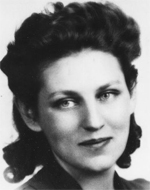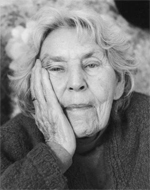

Tille Olsen joined the Amherst College faculty in 1969.
Amherst students Katherine Allyn ’12 and Annemarie Iker ’12 spent the summer of 2011 preparing a portfolio on Tillie Olsen. Their research produced a handsome volume of interviews, photos and notes on the life and work of Ms. Olsen.
We first encountered Tillie Olsen our sophomore year in Professor O’Connell’s course, “Twentieth Century American Literature.” Many of the semester’s readings and conversations are still memorable to us, but it was Tillie’s voice that stuck. After the course ended, we found ourselves talking about her novel Yonnondio time and time again, thinking about its language, characters, and story. Our conversations gradually evolved and extended from Tillie’s work to her life, and then to her time at Amherst.
A year after taking the course, we had the idea of staying on campus for our last summer at Amherst to do research on Tillie’s year in the English Department, 1969-1970. With the help of many supporters at the college, we found ourselves on campus this past June eager to begin.
We first returned to Tell Me a Riddle, Yonnondio, and Silences, Olsen’s slim but powerful oeuvre. Next, we devoured all of the secondary sources on Olsen at our library, and scoured the Five Colleges for more. We then decided a trip to Olsen’s papers at the Stanford University Archives was essential. Besides making our friends jealous, we got to spend a week with Olsen’s manuscripts, correspondence, and teaching materials. There, in California, we spoke with Olsen’s extravagantly kind daughter Julie Olsen Edwards, and our last day stumbled with strange and wonderful luck onto her parents’ graves.
After returning to Amherst, we spent the remainder of the summer speaking to Olsen’s former students, colleagues, friends, and family. Though our interest began with Olsen’s literature, what ultimately illuminated her life for us were the voices of people she taught, collaborated with, befriended, and mothered. In classrooms, we learned, Olsen encouraged her students to engage on a personal level with course literature and to develop confidence in their oral and written self-expression. In English departments, Olsen challenged academic narrowness and elitism by creating reading lists outside the accepted canon and including in her syllabi texts that reflected the breadth of human experience. At marches, speeches, and readings, Olsen expounded on topics relating to creativity, politics, gender, race, and class with unyielding conviction. And in her relationships with friends and family, Olsen spoke and wrote with warmth, tenderness, and compassion.
We quickly realized it was these voices that were the project’s great, unanticipated gift. The interviews that we thought would supplement our research instead became its core, and we worked through August to weave these conversations together with one another, and with our archival findings and our own writing. We hope the resulting portfolio will both document Olsen’s year at Amherst and prompt conversations like the ones that became so special to us this summer. Below are some excerpts from our interviews.
JULIE OLSEN EDWARDS (Olsen’s daughter): The Radcliffe Institute had given her the first place where she was able to really be a writer. And then at Amherst, she had students. She had colleagues, she had an office, she had a space. A room of her own! She had a room of her own! […] This was a woman who had never gone to college… had never graduated high school. And to have access to books and to libraries. This was a woman for whom literature had been the love of her life, and it gave her people to share that with.
SCOTT TUROW (Olsen’s creative writing student): She had important relationships with dozens and dozens of students. There were many faculty members who were very fond of her and formed friendships with her. So while she prided herself on being a fish out of water and was incredibly critical of the elitism of Amherst and what it represented, she had a lot of warm friendships.
JULIE OLSEN EDWARDS: [The Amherst year] also was one of the things that really heightened her understanding of class distinctions. I remember her just being horrified at the differences between the adjuncts and the full-time faculty, and the male faculty and the few females that were anywhere around. The kind of privilege that students had there. Another famous Tillie line is, “There’s nothing wrong with privilege, except that everybody doesn’t have it.” Her feeling about how privileged the kids at Amherst were wasn’t “they shouldn’t have this,” but that everybody should have access to those privileges.
PAUL LAUTER (Olsen’s editor at The Feminist Press): Tillie’s syllabus by itself was quite influential. A lot of people saw it and it got passed hand-to-hand. It was very influential in the field of American literature in particular, but not just American literature. It included works by working-class writers. There was an emphasis on class that most people weren’t knowledgeable about. A syllabus looks innocent enough, but it was extremely important in the field of literary study.
STEVE HILL (Olsen’s student): That’s the course that from a syllabus perspective probably made the most impact.
ERIC SEGAL (Olsen’s student): Since she wasn’t a mainstream, looking-to-get-tenure kind of a person, her course had a lot of appeal.
WAYNE WORMLEY (Olsen’s student): I was drawn to it because… it was a time of political activity, you know, Kent State, the moratorium, all of that stuff. And so I took that class because it looked like something that I would be interested in, given what I was going through and what was going on as a whole.
STEVE HILL (Olsen’s student): I think it was interesting for her and for us. We read these books on what it was like to be oppressed or what it was like to be poor, what it was like to be in the middle of a revolution. We were sort of in our own revolution at the time to a certain extent. But we were all middle-class kids, upper-middle-class kids, going to a pretty privileged college. So as much as we thought we were sort of hip and revolutionary, striking, worrying about Kent State, worrying about Vietnam… I mean, she took it to another level. This is what revolution and oppression really is.
HEATH MOORE (Olsen’s student): Tillie Olsen taught me and other people to respect the one-to-one relationship that people experience, not just to distill things into the academic intellectual discussion. Yes, approach learning from the level of human experience not distilled academic discourse. And that’s really the most valuable thing I got from her.